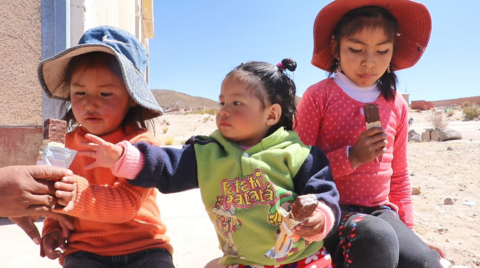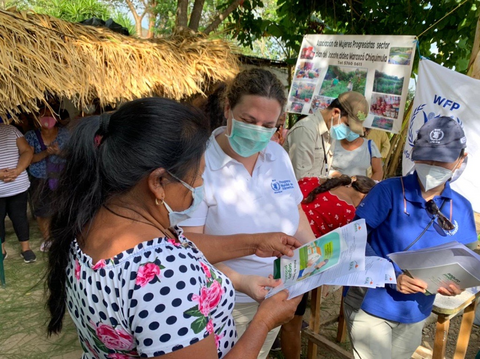In Guatemala, Indigenous is ingenious when it comes to climate change
As record hunger sweeps the globe, Indigenous peoples’ communities – who’ve been marginalized and left behind throughout history – remain disproportionately affected by food insecurity and malnutrition.
Yet the wealth of Indigenous knowledge is such that, were it courted, it could provide precious solutions to build resilience, food security and sustainability.
Deborah Suc, an agronomist with the World Food Programme (WFP) in Guatemala, knows both sides of the equation well. She is a member of the Poqomchi’ community in San Cristóbal Verapaz and works to empower farmers to respond to the challenges of climate change – reviving and then harnessing traditional know-how.
‘There are laws to protect the environment now – but we were doing that well before’
“Knowledge is passed on from generation to generation… but unfortunately some of it’s got lost”, says Suc, “for example, how to make use of natural fertilizers.”
Lured by the advertising of chemical products, Indigenous farmers have stopped using traditional methods. “This is only good in the short term, as over time it leads to soil degradation, which has a negative impact on yields,” Suc explains. Chemical fertilizers are also expensive, and the economic downturn has put them out of reach for many.
Eighty percent of people in San Cristóbal are Indigenous – the majority speak Poqomchi’, but some of the 102 communities that make up the municipality speak other languages such as Q’echi’ and Achi.
With poverty averaging at 79 percent among Guatemala’s Indigenous people – and 40 percent living in extreme poverty – communities have little or no access to technology and resources.
With Suc’s help, WFP is supporting people in rediscovering and making the most of traditional practices.
“We are not giving communities new knowledge. We are giving a scientific name to things they already knew,” she says.
One good example is the traditional milpa system, which sees maize, beans and squash being sown together. This technique, otherwise known as intercropping, allows for greater yields.
‘Over the centuries, our communities have had to adapt to change. And this is the basis of resilience’
“People here have been doing this for millennia, and now we know there is a scientific basis for this. For instance, the bean plants fix additional nitrogen in the soil, which has a fertilizing effect,” Suc explains. “If maize is cultivated on its own, it will need fertilizers.”
Based on a deep respect for – and symbiotic relationship with – nature, the Indigenous peoples’ cosmovisión, or view of the world, is also a key element in preserving the environment and using resources sustainably.
Suc cites a traditional rule whereby the cutting of trees is limited to one every five years per family – or one per year in case someone is getting married and needs to build a house – and subject to permission from the community. “There are laws to protect the environment now,” she says, “but we were doing that well before.
The closeness of Indigenous peoples’ communities to the natural environment, on which their livelihoods depend, however, makes them particularly vulnerable to extreme weather.
“The consequences of climate change are hitting us really hard,” Suc says.
In November 2020, hurricanes Eta and Iota pummelled Central America, leaving a trail of devastation in San Cristóbal too. People lost their farm animals, the fields were ravaged and infrastructure destroyed. WFP is now helping people build back their livelihoods.
“We consult with the Elders, the community development committees, the women’s committees – we hear out every voice so that our projects reflect what the community actually needs and wants,” Suc explains. Her inside knowledge of the culture helps ensure plans are made respecting community consultative and decision-making mechanisms. Initiatives include restoring water harvesting and irrigation systems, as well as community infrastructure.
“Over the centuries, our communities have had to adapt to change. And this is the basis of resilience,” she adds.
For Suc, agronomy is a way to help her community thrive. It was not her first love, though.
“As a child, I decided I wanted to be a doctor. As we sat down for our family meals and listened to stories about the horrors and suffering of the civil war, I felt I had to do something to help others – and the only way I thought I could do that was by studying medicine,” she says.
However, this would require moving to the capital, which would be too expensive. Suc was given the chance to go to university – a rare occurrence for a girl from a large Indigenous family – but had to choose among what was available locally.
“I picked agronomy, as some of the subjects were the same as for medicine and I still hoped that, at some point, I would be able move across,” she says. That never happened, but in time she began to realize how agriculture could be a tool to improve the lives of her people.
“One could say I did not fulfill my dream, but working for WFP I went full circle and am helping my community, just as I wished,” she says.
“For me, not studying was never an option. I saw getting an education as a way to overcome barriers and the discrimination we suffered.” Suc recalls early experiences of discrimination such as her mother being treated differently to other parents when she visited her school. “I asked myself ‘What can I do for her to be treated as well as the others?’ I used to think it was because of me, maybe because of my grades, but it was not that. Only, I did not see it at the time.”
Somalia: Women and children are bearing the brunt of the Horn of Africa drought
Despite being mocked her for her background, getting through university made Suc stronger. Now, she says she has no time to worry about how people see her. Instead, she will raise her voice to defend others in the face of discrimination. “I have lost my shyness in standing up for others,” she says.
The first Poqomchi’ woman obtain a university degree in Agronomy, Suc hopes she can set an example for others in what is still a traditionally male-dominated culture. “My message to other Indigenous women and girls is, if I made it, so can you,” she says.
The role of women in preserving and transmitting traditional knowledge and culture is the theme for this year’s International Day of the World’s Indigenous Peoples. However, Suc says, this still goes largely unrecognized. “Women are the custodians of the seeds. They are the backbone of the family and community,” she adds. “They are the first to get up in the morning and the last to go to bed at night to ensure the needs of the family are met and the men are able to work the fields – but their role and hard work is barely visible.”
Learn more about WFP's work in Guatemala


